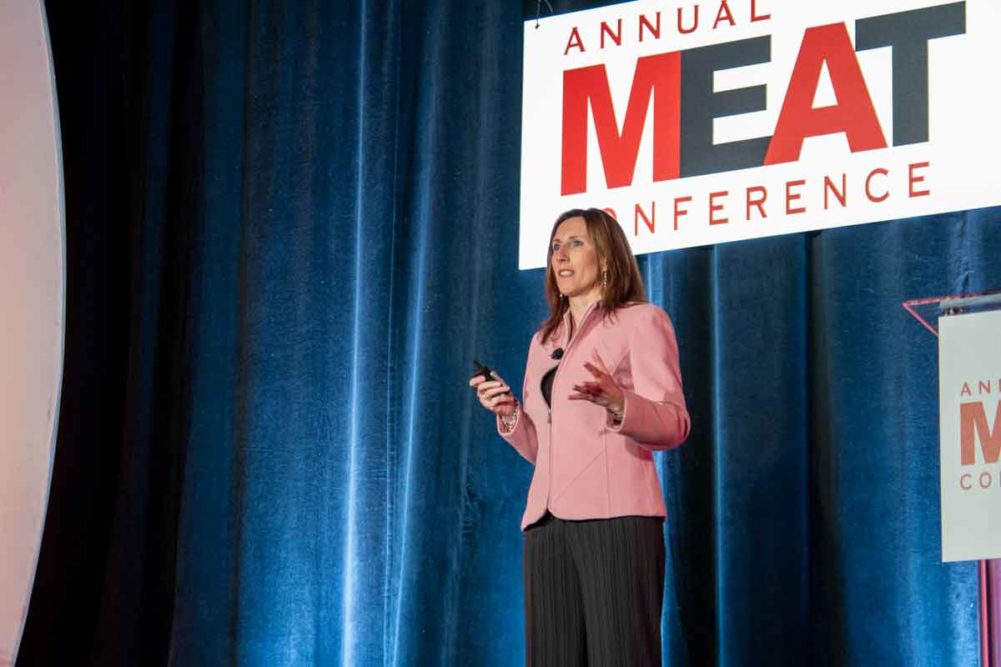NASHVILLE, TENN. — Plant-based meat facsimiles are a small, but growing category among meat consumers, while animal proteins remain firmly rooted in consumers’ diets. But the 2020 Power of Meat study revealed the industry still has work to do in order to maintain meat and poultry’s place on consumers’ plates.
Currently in its 15th year, the Power of Meat consumer survey, sponsored by Cryovac and conducted by San Antonio-based 210 Analytics, delves into the meat buying and consumption habits of consumers.
Sales of meat and poultry grew 1.0% over 2019 to $50.4 billion while volume sales climbed 0.1%.
A solid majority (81%) of consumers say “meat eater” best describes how they eat today, far ahead of flexitarians at 12%, pescatarians (2%) and vegans/vegetarians (4%). Less than 6% of consumers consider eliminating meat in the next year.
The caveat to this good news is that a segment of meat-eating consumers is reducing its consumption of meat. The Power of Meat study found that 28% of all consumers say they actively try to reduce their animal protein consumption, while 63% of self-described flexitarians say they do. And, 32% of shoppers looking to reduce their meat and poultry consumption said they are likely to eliminate some or all meat and poultry from their diet in the next 12 months.
“Meat department sales are accelerating in dollars and volume, driven by beef and chicken,” the study said. “Household penetration is steady, but a focus on smaller portions and limiting second helpings may pressure volume gains.”
“Everything about American food culture is changing,” Anne-Marie Roerink, principal of 210 Analytics, said during her presentation at the Annual Meat Conference in Nashville, Tenn. And, unfortunately, food culture isn’t always kind to animal proteins. Type ‘animal agriculture’ into the Google search engine, Roerink said, and articles about the negative environmental impact of animal agriculture and animal cruelty in the industry lead search results.
“Now, imagine millennials and Gen Zers researching things like animal welfare and the environmental impacts,” she added. “The point is that more and more negativity over time can definitely start to impact how people think about meat and poultry.”
Headwinds for the meat and poultry industry include consumer concerns over the healthfulness of meat and poultry products, animal welfare, use of antibiotics and hormones, the environmental impact of livestock production and guilt.
Plant-based persistence
Meat consumption remains the norm among a majority of consumers, but plant-based alternatives continue to gain acceptance and market share. The Power of Meat study reported total store plant-based meat alternative sales were $760 million in 2019, which represents growth of 11.8%.
In its annual Boardroom report, FMI – The Food Industry Association, in collaboration with Oliver Wyman, Mark Baum, who serves as FMI senior vice president and chief collaboration officer, provided a profile of the shopper that is attracted to plant-based meat alternatives.
“Driving the trend has been a new kind of consumer, one who is concerned with a broad range of issues – from the question of the environmental sustainability of an animal-based diet to concern over the industrialization of agriculture, from the ethics surrounding eating meat and other animal-based foods to the belief that plant-based foods are healthier,” Baum wrote.
Added to the conundrum of concerns is a desire to have the benefits of meat without eating it. These consumers want plant-based meat alternatives with the flavor, texture and nutritional benefits of animal proteins. Manufacturers of plant-based meat and dairy alternatives are succeeding on these fronts, Baum said.
“Plant-based foods are hitting on the food ‘must-win’ trifecta: taste, value, and nutrition/quality,” he wrote. “A growing number of consumers are trying out plant-based products, drawn to the category by a holistic approach to meeting their needs and convictions...”
The Power of Meat bears out this assessment. Fifty percent of people who prepare plant-based meat facsimiles with some regularity do so because they believe the products are healthy, while 36% believe they are a good source of protein. Twenty-seven percent of consumers who prepare plant-based meat alternatives with some regularity do so out of concern for the environment. Favorable taste was cited by 24% of respondents.
“Fourteen percent of households have bought plant-based foods within the last year,” Roerink said. “Out of that 14%, 40% only bought it once, so there was a huge curiosity factor there. But there were 60% who bought it two or more times, and that is exactly the kind of polarization we see in the [Power of Meat] survey as well — there’s a lot of people who did it out of the curiosity factor and there are people who eat it two or three times a day.”
Still, consumers don’t want to give up meat entirely. The Power of Meat found that interest for having vegetable and meat blends was 76% exceeding that of having plant-based meat alternatives (62%).
“Blended vegetable/meat items, such as mushroom burgers, have a higher and greater cross-population appeal, and can be a bridge to the societal and health benefits people look for, while keeping meat on the plate,” the study said.


